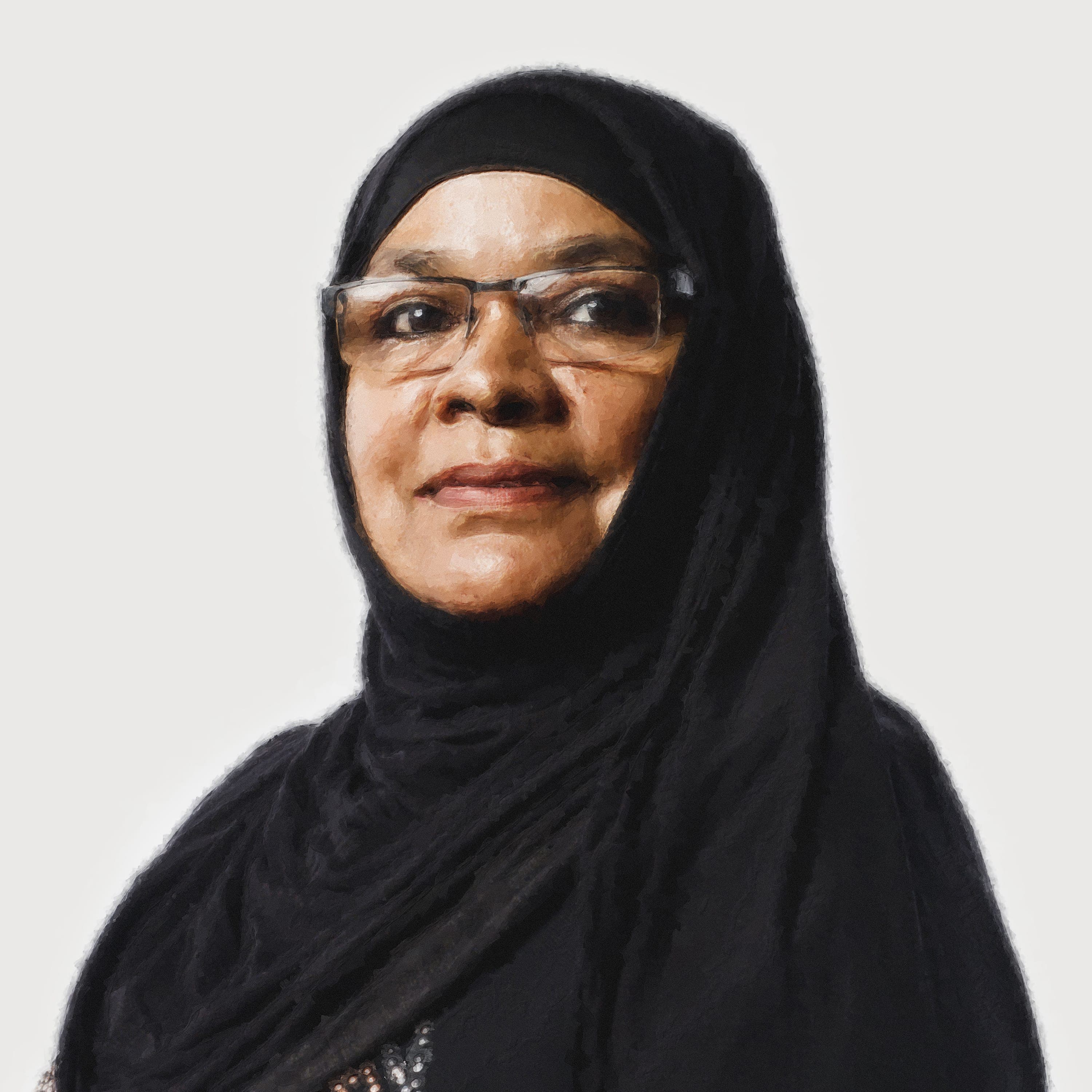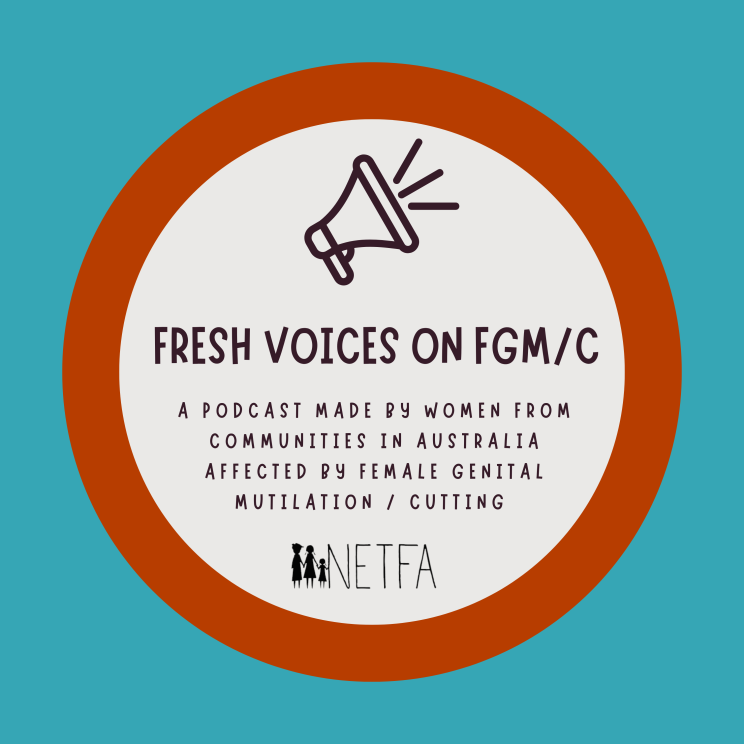About the Fresh voices on FGM/C Podcast
This podcast series was launched on 06 February 2023, on the International Day of Zero Tolerance for FGM/C. NETFA co-hosted an online seminar with our partners, Female Genital Mutilation Awareness Australia (FGMAA) and Western Sydney University. You can access the webinar, here.
This podcast series about FGM/C was co-created with women who graduated from the inaugural National Education Toolkit for FGM/C Awareness (NETFA) Leadership Program, which is coordinated by the Multicultural Centre for Women’s Health (MCWH).
Currently in Australia, stories about the practice are too often crafted and told by people without a nuanced understanding of the practice of FGM/C. Such narratives risk further stigmatizing the people and communities affected by FGM/C.
Through the NETFA Leadership Program, MCWH collaborated with 12 migrant and refugee women from communities affected by FGM/C, who are now living in Australia. The Program equipped participants with information about FGM/C as well as storytelling skills.
The podcast series includes stories from survivors, community advocates and health professionals who are all passionate about ending the practice and improving the quality of care for people affected by FGM/C. By supporting women from affected communities to be the drivers of their own narratives, MCWH aims to support community-led solutions to FGM/C.
This podcast series was created by the Multicultural Centre for Women’s Health in collaboration with 3CR Community Radio in Narrm, Melbourne. Musical composition and vocals by Ria Soemardjo. Sound recording support by Tender Trap Studios.
Episode Guide
Listen to the full podcast series on Spotify or listen to individual episodes by clicking the episode titles below.
Episode 1 – A survivor
Duration: 9.35
NETFA Leadership Program participant, Josephine Sheriff, speaks to a survivor of FGM/C.
“Badanya” (not her real name), shares about her journey coming to Australia as a refugee and the mixed experiences she has had interacting with Australian health professionals during her pregnancy. “Badanya” also shares about the mental health impacts of FGM/C and advocates for an end to the practice.
Presenter: Josephine Sheriff, with voice acting by Rani Pramesti
Episode 2 – A community advocate
Duration: 14.38
NETFA Leadership Program participant, Margaret Mathyo Bako, shares her more than 17 years’ experience supporting communities affected by FGM/C.
Margaret outlines some commonly held views by health professionals that may hinder rather than help in providing quality, culturally respectful care. Margaret also points out that health professionals have the power to help stop the practice of FGM/C, by working with affected families and communities in a holistic way.
Presenter: Margaret Mathyo Bako, interviewed by Rani Pramesti
Episode 3 – A GP
Duration: 14.30
NETFA Leadership Program participant, Lara Cristina Cruz, interviews Dr. Veena Barsiwal, a doctor and counsellor.
Dr. Barsiwal speaks about the importance of bodily autonomy, bodily integrity, and its relevance to the practice of FGM/C. Dr. Barsiwal also introduces a counselling modality she has coined called VAB: Voice, Actualize, and Balance.
Presenter: Lara Cristina Cruz with guest, Dr. Veena Barsiwal
Episode 4 – A couple
Duration: 11.03
NETFA Leadership Program participant, Patience Afor, interviews a survivor of FGM/C, “Victoria” (not her real name) and her husband, “Chris” (also not his real name).
Victoria shares about the short-term and long-term impacts of FGM/C. Both Victoria and Chris unpack the harms of the “cultural” justifications of FGM/C, and generously share their experiences about the impact that FGM/C has had on their marriage, and advocate passionately to end FGM/C.
Presenter: Patience Afor, with guests “Victoria” and “Chris”.
Episode 5 – A family divided
Duration: 10.33
NETFA Leadership Program participant, “Trish” (not her real name), shares her experiences of conflicting beliefs held by different generations of her family on FGM/C.
Trish’s parents were united against FGM/C. However, her grandmother was someone who performed the practice on girls and women in her community. Trish shares about her traumatic journey fleeing her country of birth in West Africa, to start a new life in Australia. Trish’s vision now is to eradicate FGM/C in her community and to educate people about the health consequences of FGM/C.
Presenter: “Trish”, interviewed by Rani Pramesti
Episode 6 – Seorang pendidik masyarakat
Duration: 4.08
Podcast ini membahas dampak dan bahaya sunat perempuan. Menurut Organisasi Kesehatan Dunia (WHO), ada empat macam sunat perempuan. Sunat perempuan tidak memiliki manfaat kesehatan. Melainkan, sunat perempuan dapat mengakibatkan dampak jangka pendek, maupun jangka panjang, termasuk kematian.
Language note: This podcast is in Bahasa Indonesia. This podcast discusses the effects and dangers of female circumcision. According to the World Health Organization (WHO), there are four types of female circumcision. Female circumcision has no health benefits. Rather, female circumcision can result in short-term and long-term impacts, including death.
Presenter: Nika Suwarsih
Content warning and support
This podcast series contains important stories and conversations about Female Gentle Mutilation/ circumcision /cutting. Some listeners may find this triggering.
Further support is available on the NETFA website or contact Multicultural Centre for Women’s Health on FREE CALL 1800 656 42.
Background on FGM/C in the Australian context
According to the Australian Institute of Health and Welfare (AIHW), there are an estimated “53,000 girls and women born elsewhere but now living in Australia (who) have undergone FGM/C.”1
In Australia, there are no consistent guidelines related to culturally responsive, and trauma informed care for FGM/C, and those impacted by FGM/C can experience further stigma and shame when engaging with the healthcare system.
To overcome this, the Multicultural Centre for Women’s Health supports community-led, culturally responsive, and trauma-informed solutions to ending FGM/C, which empower communities to lead the work in the prevention of FGM/C and in supporting community members affected by FGM/C.
Peringatan konten dan bantuan (Bahasa Indonesia)
Rangkaian podcast atau siniar ini berisi kisah-kisah dan perbincangan penting tentang Mutilasi Kelamin/Sunat Perempuan. Beberapa pendengar mungkin akan merasa podcast ini memicu emosi mereka.
Tautan untuk mendapat sumber informasi dan layanan bantuan tersedia pada situs web NETFA, silakan kunjungi https://netfa.com.au/for-individuals/
Atau, Anda dapat menghubungi Multicultural Centre for Women’s Health lewat panggilan TELEPON GRATIS 1800 656 421.
Tentang rangkaian podcast “Fresh voices on FGM/C” (Bahasa Indonesia)
Rangkaian podcast tentang Mutilasi Kelamin/Sunat Perempuan ini dibuat bersama dengan para perempuan yang lulus dari Program Kepemimpinan tentang Perangkat Edukasi Nasional untuk Kesadaran akan Mutilasi Kelamin/Sunat Perempuan atau National Education Toolkit for FGM/C Awareness (NETFA) Leadership Program yang pertama, yang dikoordinasikan oleh Multicultural Centre for Women’s Health (MCWH).
Pada saat ini di Australia, kisah-kisah mengenai praktik tersebut sering kali dirancang dan diceritakan oleh pihak-pihak yang tidak memiliki pemahaman yang mendalam dan peka akan praktik Mutilasi Kelamin/Sunat Perempuan. Narasi-narasi semacam itu berisiko semakin menciptakan stigma terhadap masyarakat dan komunitas-komunitas yang terdampak oleh Mutilasi Kelamin/Sunat Perempuan.
Melalui Program Kepemimpinan NETFA, MCWH berkolaborasi dengan 12 perempuan dari latar belakang migran dan pengungsi yang saat ini tinggal di Australia dan berasal dari komunitas-komunitas yang terdampak Mutilasi Kelamin/Sunat Perempuan. Program tersebut memperlengkapi para peserta dengan informasi tentang Mutilasi Kelamin/Sunat Perempuan serta kemampuan untuk bercerita (storytelling).
Rangkaian podcast ini berisi kisah-kisah dari para penyintas, aktivis masyarakat dan tenaga kesehatan yang semuanya sangat antusias untuk menghentikan praktik tersebut dan meningkatkan mutu perawatan bagi pihak-pihak yang terdampak oleh Mutilasi Kelamin/Sunat Perempuan. Dengan membantu perempuan dari komunitas terdampak supaya mereka dapat menjadi penggerak narasinya masing-masing, MCWH bermaksud untuk menyokong solusi-solusi atas Mutilasi Kelamin/Sunat Perempuan yang diinisiasi oleh masyarakat.
Rangkaian podcast ini diproduksi oleh Multicultural Centre for Women’s Health dalam kolaborasi dengan 3CR Community Radio, di Narrm, Melbourne.
Latar belakang Mutilasi Kelamin/Sunat Perempuan dalam konteks Australia (Bahasa Indonesia)
Menurut Australian Institute of Health and Welfare (AIHW), diperkirakan terdapat sekitar “53.000 anak perempuan dan perempuan yang lahir di negara lain tetapi sekarang tinggal di Australia (yang) telah menjalani Mutilasi Kelamin/Sunat Perempuan.” 1
Di Australia, tidak ada panduan konsisten untuk perawatan yang peka budaya dan berdasarkan informasi trauma untuk Mutilasi Kelamin/Sunat Perempuan, dan mereka yang terdampak oleh praktik ini dapat mengalami stigma dan rasa malu lebih lanjut ketika berinteraksi dengan sistem layanan kesehatan.
Untuk mengatasi hal ini, Multicultural Centre for Women’s Health memberi dukungan bagi solusi-solusi inisiatif masyarakat yang peka akan budaya dan berdasarkan informasi trauma untuk mengakhiri Mutilasi Kelamin/Sunat Perempuan, yang memberdayakan masyarakat untuk memimpin upaya pencegahan Mutilasi Kelamin/Sunat Perempuan dan memberi bantuan kepada anggota masyarakat yang terdampak Mutilasi Kelamin/Sunat Perempuan.

